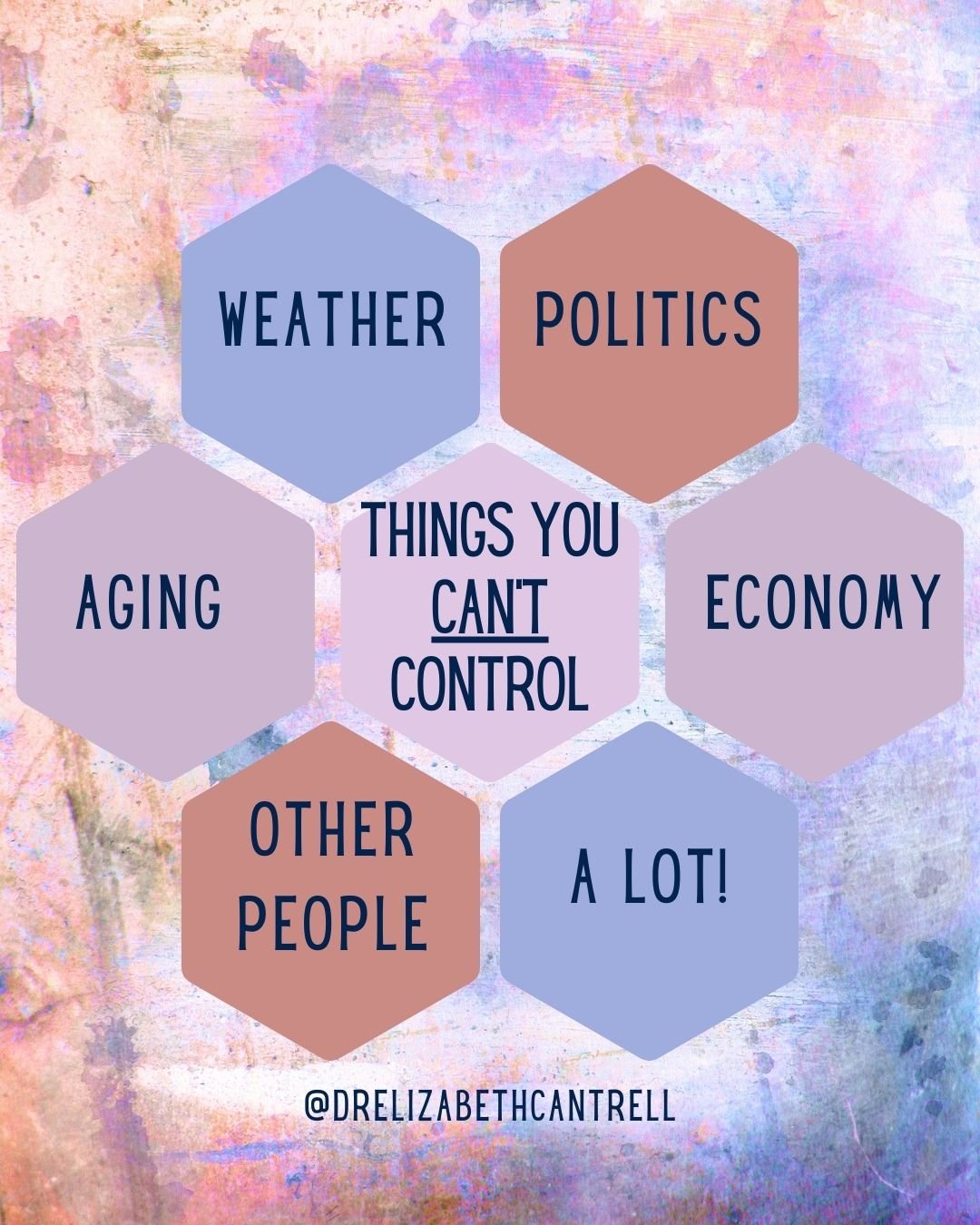…But you can control your next step.
Becoming more stress resilient starts with knowing where to focus your energy:
On the things you can control.
Share this with a friend who can relate 💖

Becoming more stress resilient starts with knowing where to focus your energy:
On the things you can control.
Share this with a friend who can relate 💖

Stress often comes from trying to control the uncontrollable.
So, next time stress creeps in, try this:
1️⃣ Notice you feel stressed.
Just pause and recognize what’s going on.
2️⃣ Ask: Is this inside or outside my control?
If it’s outside your control, try to let it go, but still move on to step 3.
3️⃣ Make a plan.
Choose a few things you CAN do (even if the actual stressor is outside your control).
✔ Can you go for a walk?
✔ Can you listen to music?
✔ Can you make a phone call?
✔ Can you research a solution?
Training your brain to respond to stress in a healthier way takes some practice, but it’s worth it.
Share this with a friend who can relate 💖

Most doctors don’t ask about stress.
Because they don’t have any way to “treat” it.
While we also don’t “treat” stress as a disease, we have a deep functional medicine toolkit to help your body become more resilient to stress.
If you suspect stress might be affecting your health—but aren’t sure where to start—here are some questions you could ask your practitioner👇
(Hint: you’ll get more helpful answers from a holistically minded practitioner 😉)
1️⃣ Do I need stress hormone testing?
Stress can disrupt cortisol and DHEA, leaving you feeling wired but tired, exhausted, or constantly on edge. Testing these hormones can show if you need extra support.
2️⃣ Could stress be affecting my gut?
The gut-brain connection is a two-way street. Stress can disrupt digestion, and poor gut health can make you less resilient to stress. Functional testing can uncover whether your gut needs targeted support.
3️⃣ What nutrients do I need when I’m stressed?
Stress burns through key nutrients like magnesium, B vitamins, and vitamin C, which can lead to brain fog, fatigue, and trouble sleeping. A practitioner trained in nutrition can help you figure out what your body needs.
4️⃣ Could stress be affecting my hormones?
Stress hormones interact with other hormonal systems and can worsen issues like PMS, cycle changes, mood swings, and blood sugar swings. A practitioner trained in functional medicine can help make sense of the bigger picture.
The point is:
Stress is not an isolated experience.
It affects your whole body.
If you’re looking for a comprehensive approach that looks at the WHOLE person, that’s what we do.
Schedule your first visit with Dr. Cantrell to begin your journey to wellness! 🌿

Myths & Facts about Stress 👇
📍Myth 1: You just have to shift your mindset.
Stress is not just in your head—it’s in your body and nervous system. While mindset shifts can help, they will only stick if your body feels safe. Stress resilience comes with nourishing foods, breathwork, movement, and deep rest.
📍Myth 2: Intense exercise helps burn off stress.
Movement is amazing for releasing stress—just don’t overdo it. Intense workouts can worsen exhaustion from stress, especially if you’re already running on empty.
📍Myth 3: Coffee helps you power through stress.
Not everyone handles caffeine the same way. Too much can overstimulate your stress response and lead to burnout. If you’re relying on coffee to push through exhaustion, your body may be asking for real rest instead.
📍Myth 4: If you’re not anxious, you’re not stressed.
Stress can show up in all kinds of sneaky ways: things like low energy, brain fog, trouble concentrating, headaches, or digestive upset. Your mind is not necessarily the first place you’ll feel it.
📍Myth 5: Stress is always bad.
Stress is never fun, but it can be a driving force for personal growth and a motivation to take action on things you may otherwise ignore. Stressing that stress is bad will only make it worse.
🤔 Did you know that April is Stress Awareness Month?
Watch my posts for more on ways functional medicine can address stress.
And let me know in the comments:
Which of these myths have you been sucked into? ⤵️
#drelizabethcantrell #naturalmedicine #naturopath #naturopathicmedicine #functionalmedicine #functionalmedicinetesting #stressresilience #stresssupport #stressrelief #colga #columbusga

🌱 What does a ‘plant-based’ diet really mean?
I just saw this headline: “Evidence Suggests Plant-Based Diets Reduce Cancer Risk.”
But it turns out that plant-based means different things to different people (and to different researchers 🧐).
One recent study found that the healthy gut microbes in vegans also appeared in omnivores who ate more plant foods—meaning that eating more fruits and veggies makes a difference even without eliminating meat 🥩🥦
Plant-based diets can mean:
✨ vegan
✨ vegetarian
✨ omnivore
The most extensively researched plant-based diet is the Mediterranean Diet, which includes 🫒healthy fats like olive oil and nuts, 🐟moderate amounts of lean proteins like fish or poultry, 🥗and at least ⅔ of the plate coming from fruits, veggies, and plant foods.
So, why do plant-based diets reduce the risk of cancer?
It could be any of these things:
✔️ a healthier microbiome
✔️ lower inflammation and oxidative stress
✔️ better blood sugar regulation
✔️ fewer processed foods
The point is that ⭐️ food quality matters and you don’t need to be vegan to get the health-promoting benefits of a plant-based diet.
Are you tired of complicated and confusing nutrition information?
The truth is that the same basic principles will never change:
Our bodies crave whole and nutrient-dense foods.
This is the foundation we start from with all our patients, tailoring personalized plans based on each individual’s unique needs.
If you’re ready to finally understand what your body needs to feel good, head over to our website to schedule your first visit! 🌱